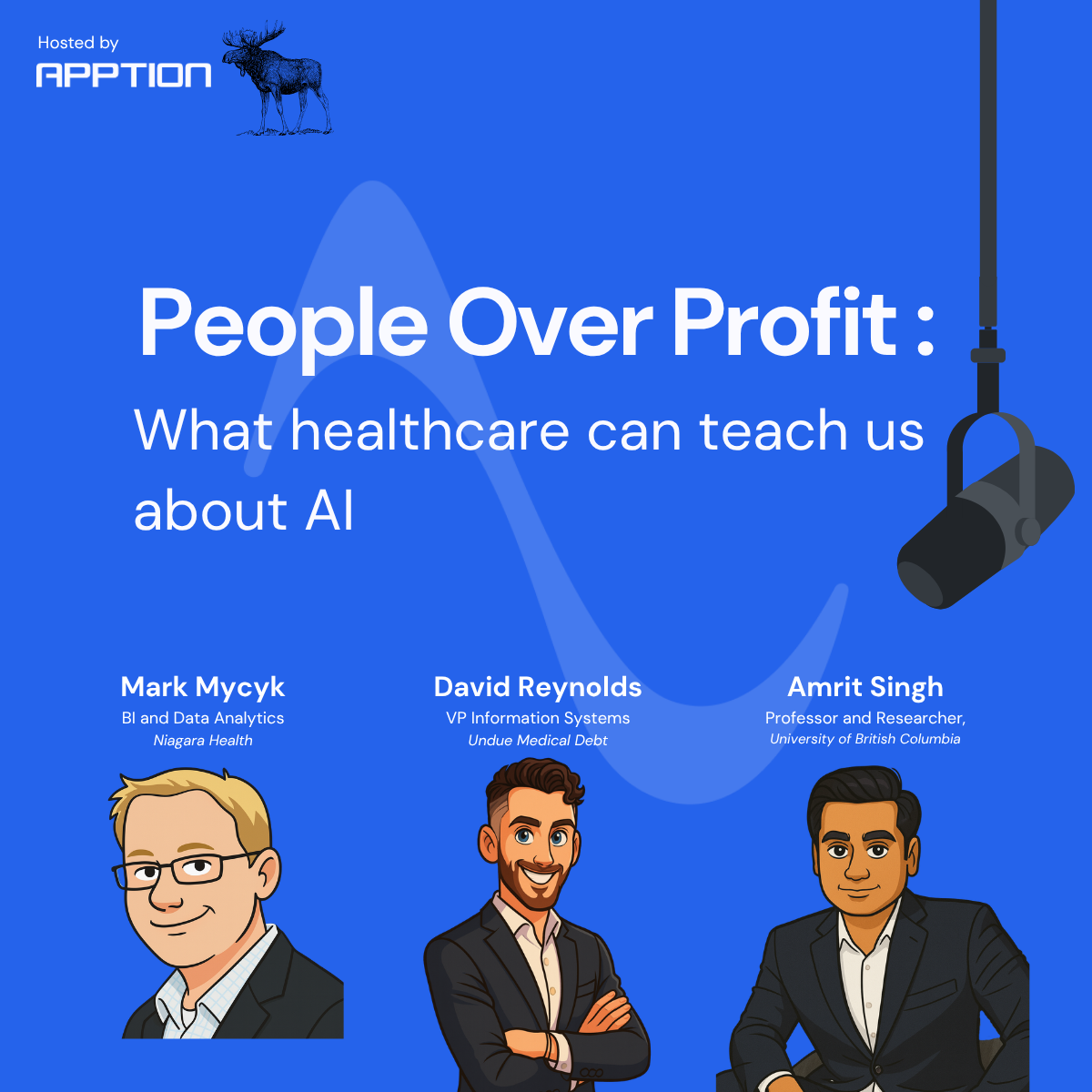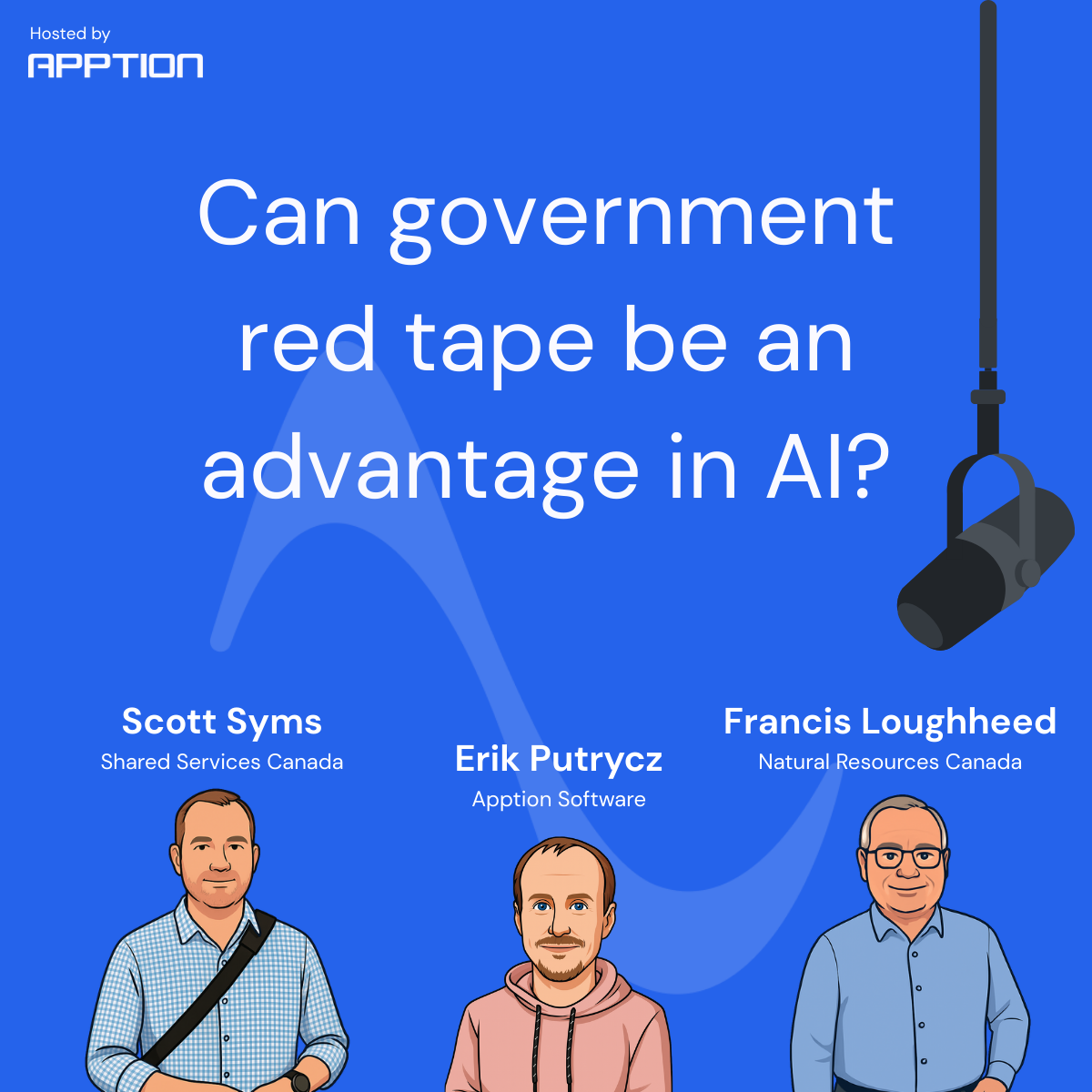S2E2: The data & eh'I podcast
Join Apption’s Adam Joe in a candid conversation with healthcare leaders Mark Mycyk of Niagara Health, David Reynolds of Undue Medical Debt, and Amrit Singh from the University of British Columbia.
Together, they’ll explore how healthcare organizations are using AI to design outcome-driven pilots, where patient care, safety, and impact matter more than speed. Drawing from their experiences in clinical research, public healthcare, and financial systems, the panel will discuss what makes AI trustworthy, how holistic data can transform decision-making, and what other industries can learn from healthcare’s regulated, accountable approach.
Don’t have time to listen to the full episode?
No problem! check out our episode run down ⬇
In this episode of The Data and Eh’I podcast, leaders from Niagara Health, BC Children’s Hospital/UBC, and Undue Medical Debt tackle a pivotal question: if AI can work responsibly in healthcare’s high-stakes, highly regulated environment, what can the rest of us learn?
It’s a candid, live-panel conversation about outcomes over productivity, trust, privacy, and turning pilots into real impact.
Episode: People Over Profit — Healthcare & AI
What you’ll hear:
Outcomes > Efficiency: AI success is measured in patient safety, equity, and clinical outcomes, not just speed.
Trust, consent, & governance: Why PHIPA/HIPAA, transparency, and informed consent are table stakes.
Holistic data ≠ automatic safety: Unifying messy, multi-modal data can reduce risk, or create new kinds of risk, if governance lags.
From pilots to practice: The hard parts are data quality, digitization, workflow integration, and local data residency (for Canada).
Cross-industry lessons: Healthcare’s privacy/security rigor and “human-in-the-loop” approach are blueprints for everyone.
Highlights by speaker
Mark Mycyk — Niagara Health, Data & Analytics
Stresses informed consent, transparency, and governance as the starting line.
Flags Canadian data residency requirements and cost constraints as real barriers to scaling.
Sees clear opportunity in patient-flow modeling, med optimization, and targeted use cases that reduce errors and unnecessary tests.
“Healthcare has the greatest potential, but also the greatest risks. Start with governance, consent, and transparency.”
Dr. Amrit Singh — UBC, Computational Biology & Digital Pathology
Shares a concrete use case: AI-assisted digital pathology for heart-transplant rejection, where many tools are FDA-cleared (non-inferior) to pathologists.
Emphasizes multi-center, diverse data and warns how scanner updates and demographic skew can silently shift performance.
Argues that real-world adoption hinges on digitization and workflow fit, not accuracy metrics alone.
“Accuracy isn’t everything. If slides aren’t even digitized, models won’t be used. Integration and data quality drive impact.”
David Reynolds — Undue Medical Debt, VP, Information Systems
Explains how the nonprofit uses data to abolish medical debt and why privacy compliance and model trust matter, even outside direct clinical use.
Notes today’s reliance on credit-agency data for income testing and the need for broader signals to avoid excluding the most vulnerable.
Shares cautious exploration of AI agents for engineering tasks and synthetic data for safe testing.
“People trust simple, explainable rules. Even if models are better, adoption hinges on understandability and controls.”
Big ideas
Known risk vs. unknown risk: Healthcare compares the “known risks” of current practices with the “unknowns” introduced by AI.
Holistic data helps, if governed well: Combining imaging, clinical history, and molecular data can improve prediction, but demands bias checks, diversity, and site/tech drift monitoring.
Privacy = cybersecurity: The same controls that protect PHI strengthen overall security posture, a lesson every industry can adopt.
One surprising consensus
Before any AI project can succeed, the real question isn’t about models, it’s data quality.
“Data quality and governance aren’t nice-to-haves—they’re the foundation.”
Why it matters beyond healthcare
Listeners leave with a clear playbook: start with governance, consent, and data quality; integrate AI into workflows with humans in the loop; scale only after pilots prove outcome impact; and treat privacy/security as core product features.


